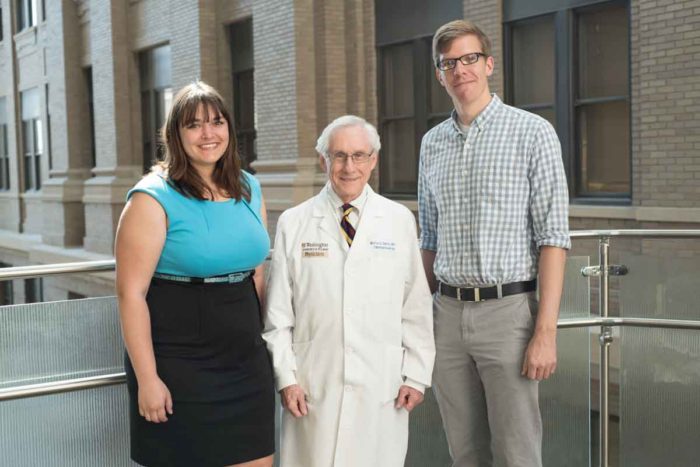Medical students win first, second places in national poetry contest
Alpha Omega Alpha honor society publishes their pieces
 Robert Boston
Robert BostonStudents at Washington University School of Medicine in St. Louis took the top two spots in a poetry contest sponsored by the national Alpha Omega Alpha Honor Medical Society (AOA). The university’s AOA councilor, Morton E. Smith, MD, professor emeritus of ophthalmology and visual sciences, called the wins by students Alexandra Houston-Ludlam (left) and Michael Slade (right) ‘unprecedented.'
Life on the brink of death inspired the poetry of two students at Washington University School of Medicine in St. Louis who won first and second place in an annual competition sponsored by the Alpha Omega Alpha Honor Medical Society (AOA).
Michael Slade’s first-place poem, “Requiem,” and Alexandra Houston-Ludlam’s second-place piece, “My First Patient,” were published in August in AOA’s literary journal The Pharos.
“Winning the top two spots is unprecedented,” said the School of Medicine’s Morton E. Smith, MD, professor emeritus of ophthalmology and visual sciences, associate dean emeritus and councilor for the university’s Alpha Omega Alpha chapter. “It speaks to the compassion and talent of Michael and Alexandra.”
Altogether, AOA received 123 poetry submissions from chapters across the country.
“For two students from the same institution to rise to the top is an extraordinary feat,” said Dee Martinez, managing editor of The Pharos.
Slade, a fourth-year medical student, said the patient he wrote about came from a blend of experiences and conversations he has had with attendings, residents and other medical students. “He’s a product of frustrations I’ve had with friends and relatives,” Slade said. “He is also, more than a little bit, me.
“When you start working in the hospital in your third year of medical school, absolutely everything is overwhelming,” Slade continued. “You’re trying to keep track of a million tasks and impress a seemingly endless parade of people evaluating you. It’s easy to lose track of the fact that, as future physicians, we’re a part of seminal events in people’s lives. Writing is a chance to stop and reflect, to synthesize the stress and the chaos and the heartbreak we see and participate in on a daily basis. It’s a chance to find something meaningful in what often feels completely random.”
Inspired by first-semester anatomy lab, Houston-Ludlam wrote about her expectations compared with her realities of medical school. “Before I came here, I saw the science of medicine being distinct from the interpersonal intimacy of physician-patient contact,” she said.
“The people who donate their bodies to Wash U for the purpose of furthering medical education have had a significant impact on me,” said Houston-Ludlam, who is enrolled in the university’s Medical Scientist Training Program. “In my case, this person not only taught me about human anatomy, using the physical self as an example. This person also helped me practice how to put aside my own reservations and anxieties to focus on the patient-centered task at hand, and serves as a metaphor for my transition to medical student. This poem is first and foremost an expression of my gratitude to this person.”






